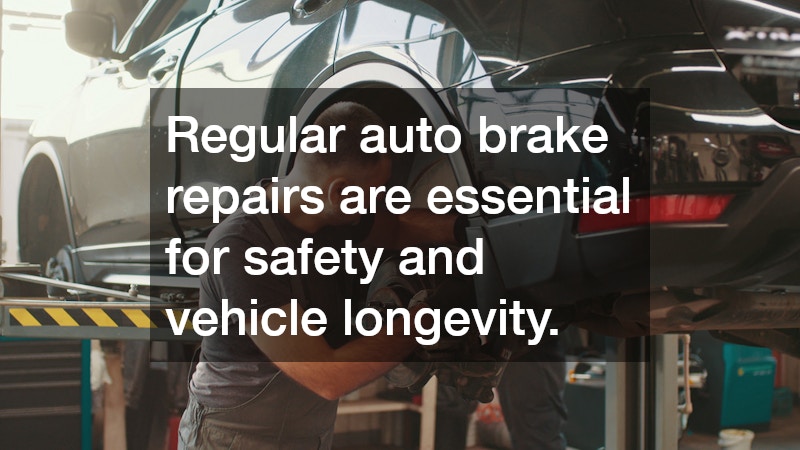Understanding when to get auto brake repairs is crucial for maintaining vehicle safety and performance. This article will guide you through the essential aspects of brake maintenance, shedding light on common questions and providing expert insights.
How to Identify When Your Brakes Need Repair?
Warning Signs of Brake Problems
One of the most common warning signs of brake issues is the presence of unusual noises, such as squealing or grinding, when applying the brakes. These noises typically indicate worn brake pads or other components that require attention.
Changes in braking performance, such as a soft or spongy brake pedal, can signal underlying problems that need to be addressed. Routine checks can help catch these issues early before they become more severe.
Vibrations or pulsations felt when braking may suggest warped rotors, which can affect the efficiency and safety of your braking system. Timely inspection and maintenance can prevent these warning signs from escalating into major safety risks.
Regular Maintenance Checks: What to Look For
Regular brake inspections are essential for ensuring optimal vehicle performance and safety. During these checks, it’s important to look for wear and tear on pads, rotors, and other vital components.
Mechanics may inspect the thickness of brake pads and check for any signs of fluid leaks that could compromise braking effectiveness. Additionally, they often check the condition of the brake lines and brake fluid to ensure proper function.
Drivers should also be attentive to how the vehicle stops and listen for any unusual brake noises, as these can be indicators of needed maintenance. Staying proactive with brake inspections can significantly extend the life of your braking system.
How Frequently Should Brakes Be Serviced?
Manufacturer Recommendations
Vehicle manufacturers provide specific guidelines on how frequently brakes should be serviced, typically based on mileage or time intervals. It’s crucial to follow these recommendations to maintain warranty coverage and ensure peak performance.
Generally, manufacturers suggest checking brakes every 10,000 to 15,000 miles, or once a year. This ensures that any developing issues can be addressed before they evolve into significant problems.
Adhering to manufacturer guidelines not only enhances safety but also contributes to the longevity of brake components. Preventative care based on these recommendations can minimize the risk of unexpected failures.
Factors Affecting Brake Wear
Driving habits play a significant role in the wear and tear of brake components. Frequent braking, high speeds, and aggressive driving behavior can accelerate the deterioration of brakes.
Road conditions also influence how quickly brakes wear out. Driving on rough or mountainous roads can exert additional pressure on the braking system, requiring more frequent checks.
The type of vehicle, including its weight and design, can also dictate how quickly brake components need replacing. Understanding these factors helps in planning maintenance schedules better suited to individual needs.
What Are the Risks of Delaying Brake Repairs?
Safety Hazards of Worn-out Brakes
Worn-out brakes pose significant safety hazards, increasing stopping distances and reducing vehicle control. In emergency situations, effective brakes are crucial for avoiding collisions.
Delay in repairs can lead to brake failure, presenting an increased risk of accidents and injury to passengers and pedestrians. Ensuring timely brake maintenance is critical to safe driving experiences.
Braking system failures may also cause secondary damage to other vehicle components, leading to more extensive and costly repairs. Proactive maintenance helps in preventing such dangerous scenarios.
Cost Implications of Postponed Repairs
Neglecting brake repairs can result in higher repair costs over time. What begins as simple wear on a brake pad can progress to damage that affects the rotors and calipers if not addressed promptly.
Replacing worn-out parts becomes more expensive the longer repairs are delayed. Addressing small issues early prevents the need for costly component replacements and minimizes downtime.
Therefore, timely brake repair not only enhances safety but also proves to be an economically sound decision. Ensuring that brake systems are in good working order can save unnecessary expenses in the long run.
Prioritising Brake Maintenance for Long-Term Safety
Regular auto brake repairs are essential for safety and vehicle longevity. By staying informed and proactive about brake maintenance, you can prevent potential dangers and save on costly repairs. Remember, a well-maintained brake system ensures a safer driving experience. Keeping an eye on the health of your brakes will allow you to enjoy a smoother and more secure journey on the road.
Neglecting brake maintenance can lead to decreased performance, increased stopping distances, and even complete brake failure. Scheduling routine inspections and addressing any unusual noises, vibrations, or warning lights promptly can extend the life of your brake components. Investing in timely repairs helps maintain optimal vehicle control, particularly during sudden stops or emergencies. Ultimately, prioritising brake care not only protects you and your passengers but also contributes to the overall reliability and value of your vehicle.



